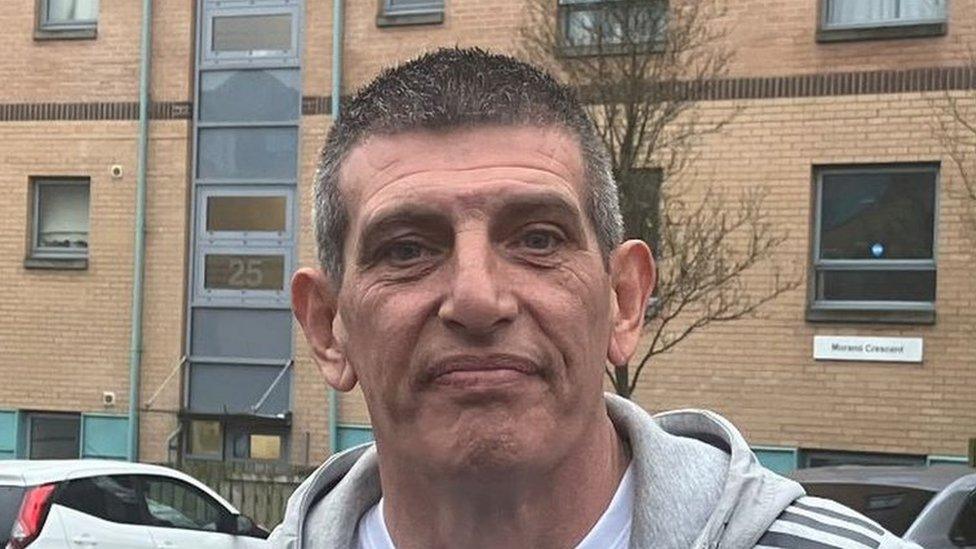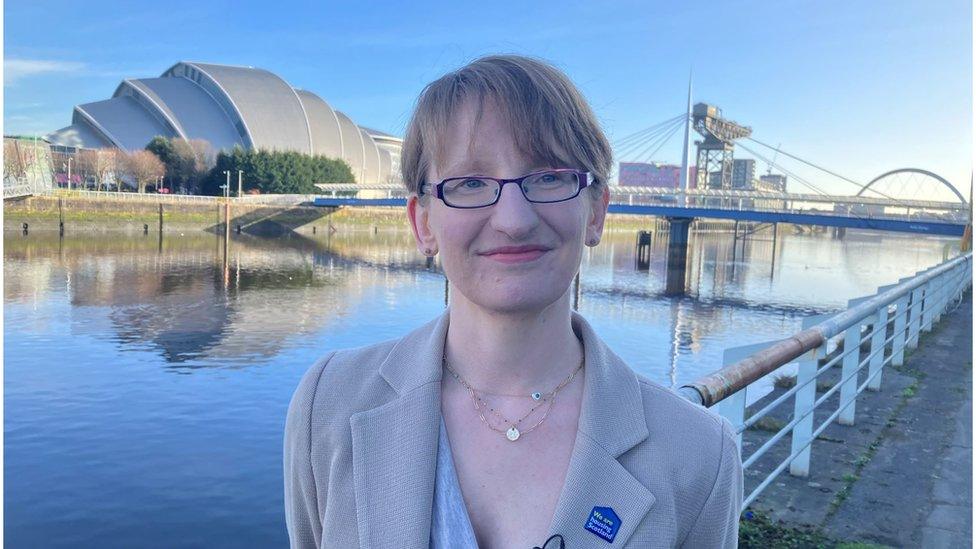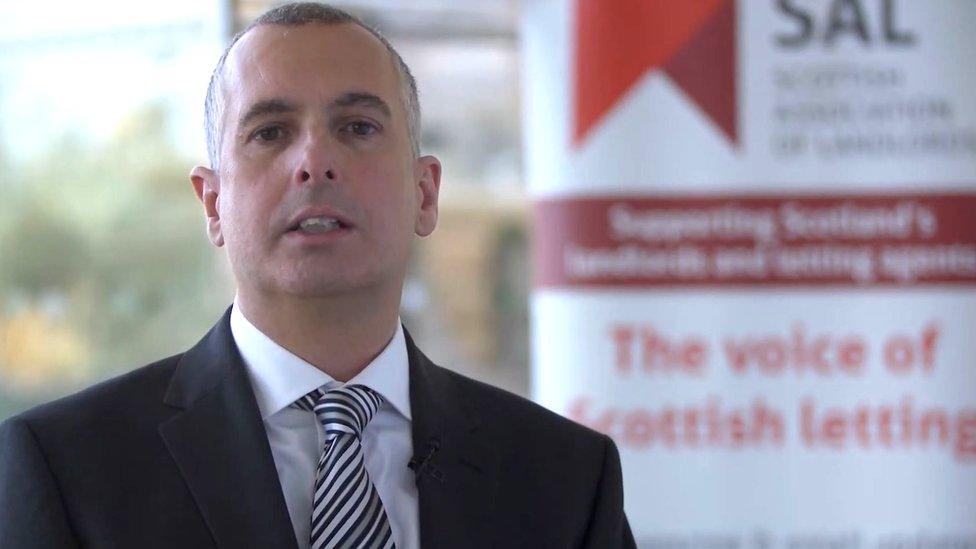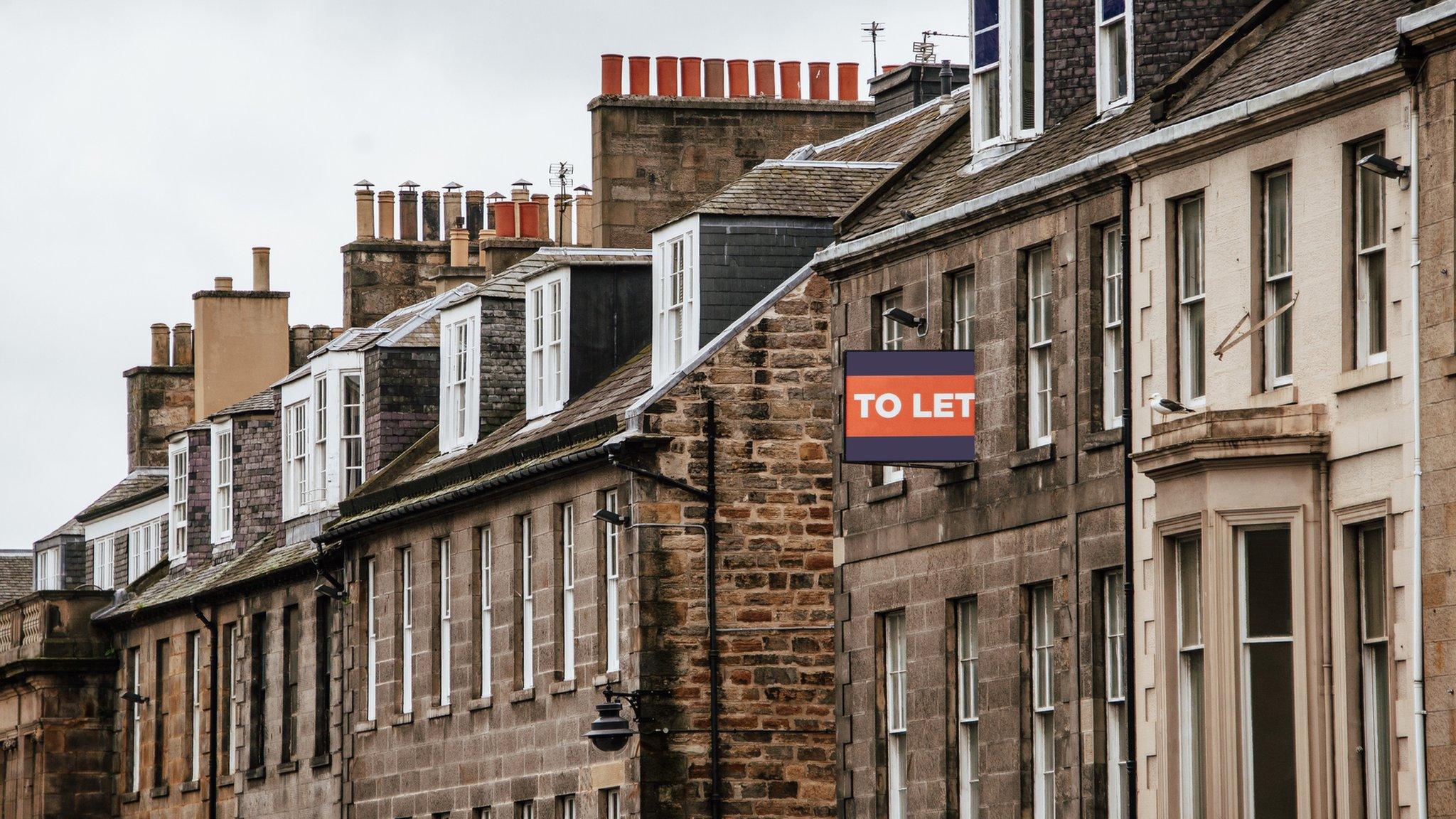'Eviction ban' not protecting most at-risk
- Published

Gordon MacRae, Shelter's assistant director, said there has never really been an eviction ban for social tenants
The Scottish government's halt on evictions is "failing to protect those most at risk of homelessness", according to housing charities.
The temporary restrictions on evicting tenants came into force in September.
They were part of a series of emergency measures designed to help renters during the cost of living crisis.
However, the BBC has data that shows at least 125 social housing tenants have been evicted from their homes since the laws were put in place.
Freedom of information responses to BBC Scotland also show more than 720 tenants have been served with notices warning them that court action could begin.
The Cost of Living (Tenant Protection) (Scotland) Bill gave ministers temporary powers to cap rents for private and social tenants, with evictions only allowed under certain circumstances.
However, the protection against eviction does not apply to those with arrears of six months or more or to social housing tenants with debts of more than £2,250.
Housing charity Shelter Scotland warned that it was "wrong" for the Scottish government to tell people there was an eviction ban in place at all.
"There's never really been an eviction ban for social tenants," said Gordon MacRae, Shelter's assistant director.
"We argued before the bill was passed that the legislation didn't address the needs of people at the closest risk of becoming homeless."
He said that although £2,250 seemed like "an awful lot of money", it was very rare that tenants were simply refusing to pay their rent and that low income households were facing "higher bills with less money".
The Scottish government said its protection went further than anywhere else in the UK to protect tenants but it had always been clear there were circumstances where an eviction could take place.

'I got behind on my rent and buried my head in the sand'

Paul Dodwell was due to be evicted from the flat he had lived in for more than 10 years
In January this year, social housing tenant Paul Dodwell was due to be evicted from the flat in Glasgow's Maryhill where he had lived for more than 10 years.
He narrowly avoided eviction only because his local community fundraised to pay off his rent arrears.
Paul said that he works full-time as a roofer but he lost work during the Covid lockdown and fell behind on his rent.
"Because of Covid and the cost of living, it was just that way where I owed people money," he told BBC Scotland.
"So I got behind on my rent and buried my head in the sand, which I shouldn't have done, then before I knew it they were wanting to evict me out the house."
He owed £2,900 at the time, but because his case went to court and he was no longer allowed to make rent payments, this debt increased to about £3,700.
"Once I missed one payment, it piled on top of what was already there and it snowballed," Paul said.
He said he had no prospect of paying back the debt in full because he worked for an agency at minimum wage, and facing eviction had a huge impact on his mental health.
Paul said that he offered to pay an extra £20 a week in rent to gradually clear his arrears but the housing association rejected this.
"I couldn't sleep, I think I lost about a stone in weight with worry, worrying where I'm gonna go, where I'm gonna put my head down," he said.
After members of his local community gave him money to help pay his debt, Paul was able to stay in his home.
A spokesperson for Queen's Cross Housing Association said Paul "consistently failed" to pay his rent and adhere to repayment arrangements, and that they made "repeated attempts" to discuss this with him.
They added this was their first arrears eviction decree in five years, and were "pleased that Mr Dodwell paid his arrears in full and retained his tenancy".

Toxic conundrum
Shelter Scotland said that "the majority of clients" who faced eviction "simply can't pay, rather than won't".
Mr MacRae said the cost of living crisis, reduced income from Covid and increasing debts were all factors that contributed to someone building up rent debt.
"That's the toxic conundrum we face, and that's why it's very important government understands we have a very vulnerable group of households at real risk of making Scotland's existing homelessness crisis even worse," he said.
Mr MacRae said the intention of the eviction ban was "a good thing" but the reality was that the £2,250 figure had "set a new floor for the point at which eviction proceedings would start".
He said that previously most tenants facing eviction would owe double that amount before being taken to court.
Mr MacRae added that statistics showed rent arrears were now at an "alarmingly high level" but that there was "no business case" for evictions as the cost to the taxpayer of making someone homeless through eviction could be up to £25,000.
The charity called on the Scottish government to build new social housing and increase the level at which someone can be evicted for rent arrears.

Carolyn Lochhead, from the Scottish Federation of Housing Associations, said it was important for tenants to know that housing associations wanted to keep people in their tenancies
Carolyn Lochhead, the director of external affairs for the Scottish Federation of Housing Associations, said it was important for tenants to know that housing associations wanted to keep people in their tenancies.
"If you are worried about paying your rent, speak to your housing association because they want to help you, they can help you, and they will help you," she said, adding that they will always discuss repayment plans with tenants.
A Scottish government spokesperson said: "Our emergency legislation has given tenants additional protection during these challenging and uncertain economic times. It has gone further than anywhere else in the UK in helping to protect tenants across the rental sector."
They added: "The emergency legislation introduces additional restrictions against the enforcement of eviction, but we have always been clear that there are certain circumstances where an eviction can take place.
"This includes where a social tenant owes more than £2,250 - calculated as six months' average rent in the social rented sector - to avoid situations where tenants are simply adding more and more debt which they have little prospect of clearing."
- Published13 October 2022

- Published6 October 2022

- Published19 January 2023
